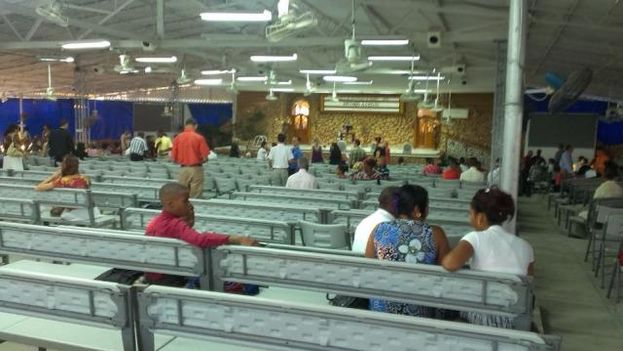
![]() 14ymedio, Zunilda Mata, 17 November 2016 — Discriminated against for decades, Cuba’s Jehovah’s Witnesses just opened an employment agency that focuses on the “honesty and decency” of its people. The database “is an opportunity to advertise the skills that the brothers have in different professions and trades,” says Tamara Sanchez, one of the managers.
14ymedio, Zunilda Mata, 17 November 2016 — Discriminated against for decades, Cuba’s Jehovah’s Witnesses just opened an employment agency that focuses on the “honesty and decency” of its people. The database “is an opportunity to advertise the skills that the brothers have in different professions and trades,” says Tamara Sanchez, one of the managers.
As a “private initiative,” although it is linked to the religious community, she describes the new project as one to connect the private sector with “serious and decent” workers. Close relationships within the congregation are a plus for the rapid transmission of information.
“When I look for a job with the state and they realize that I am Jehovah’s Witness they see me as a weirdo,” said Mario Francisco. “I was not a Pioneer [in elementary school] and did not wear the neckerchief,” he recalls.
The young man works in the private sector as a caregiver for the elderly. He considers that job opportunities through the agency could be “a way to erase prejudice.” He notes that he only works with families who share his beliefs because he feels “more respected.”
“Please, if you are not a witness, do not call to register (…), although we do not doubt that you are an honest person, we can not accept your registration,” clarify the managers of the employment exchange. The project is focused only on those who “find it very difficult to get work in these critical times.”
The Cuban government’s relationship with Jehovah’s Witnesses has been tense since the coming to power of Fidel Castro. Many were interned in the Military Units to Aid Production (UMAP) camps that operated on the island between 1965 and 1968 – along with other religious believers, homosexuals and political dissidents – while others were driven underground and into exile.
The official animosity continues today, but some years ago the authorities issued permits for the congregation’s meeting halls to open. “We are allowed to meet but there is no public recognition that we exist, that we are here and we are not criminals or bad people,” says the nurse.
The stigma is felt strongly in teaching and working life. “There is not a single Jehovah’s Witness who is the manager of a hotel, a hard-currency store manager or a state official,” says Mario Francisco. In his opinion, this group is still seen as “unreliable” for certain positions.
The latest report on Religious Freedom in the World (2014), released by the United States Department of State, reveals that the Cuban authorities continue to monitor the activities of religious groups on the island. Among the hardest hit are the Jehovah’s Witnesses.
Although the Constitution, in force on the island since 1976, enacts that “the State recognizes, respects and guarantees religious freedom,” the Office of Religious Affairs of the Communist Party staunchly monitors construction permits for new houses of worship.
Excessive controls have strengthened the informal networks that serve the Witnesses to spread their beliefs from door to door, to help each other in case of need and to warn each other of dangers. They have now extended these networks to the job search.
Through a phone call, a text message or an e-mail sent to the organizers of the new employment agency, applicants submit their professional skills and contact details. The project has two databases, one public and one private.
The public information can be read on classified site such as Revolico and others circulate in the Weekly Packet. There are more than twenty occupations included and they include everything from plumbing to cooking, cleaning, medicine and jewelry making.
“Often someone would ask us for a serious, honest and responsible worker for a job and we didn’t have ways to identify the brother who would be ideal for the position,” the promoters explain. The list will favor those who until now have been adversely affected by prejudice.
“The witnesses who are contacted for a possible job will be duly questioned about their beliefs and their faithfulness in the service of the Lord,” they clarify. A test that Mario Francisco deems necessary. “When people ask me for my religious beliefs, it is usually to not give me the job… but in this case I will answer the question without fear.”
